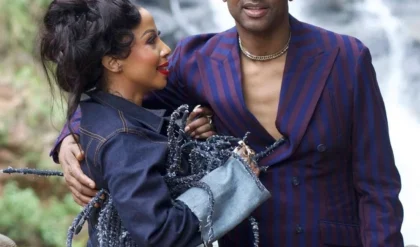The roles and responsibilities of queens in the Zulu royal household, as shared by King Misuzulu kaZwelithini’s wives, provide a fascinating insight into their lives, expectations, and contributions to the monarchy and their communities.

In their discussions, they outline their roles in supporting the king, fostering development, and addressing societal issues, showcasing their dedication to fulfilling their duties within the Zulu royal framework.
Queen Ntokozo Mayisela, the first wife of King Misuzulu, has been outspoken about her commitment to the community, particularly in grooming and mentoring young boys.
In her role as a queen, she has prioritized this initiative, stating that it is a critical part of her duties. Together with the king, they identified that young boys in their community often face challenges that, if left unaddressed, could lead them down harmful paths, such as gender-based violence (GBV).
The queen believes that grooming young boys and providing them with mentorship is crucial in fostering respect, discipline, and understanding, which will ultimately benefit not only the individuals but the entire community.
Queen Ntokozo’s focus on young boys highlights an essential aspect of her vision as a queen—contributing to the eradication of societal issues like GBV by addressing root causes.
The program she leads involves identifying these young boys, understanding their struggles, and providing them with the tools and guidance needed to overcome challenges.
In doing so, she demonstrates her proactive approach to creating a better future for the next generation.
Her role extends beyond the palace walls, as she actively participates in community initiatives, such as cooking for underprivileged children and donating groceries to those in need. These actions reflect her belief in the importance of giving back to the community and fostering unity and compassion.
On the other hand, the second queen, whose identity remains less publicly explored in comparison to Queen Ntokozo, has shared her perspective on what it means to fulfill the role of a queen in the Zulu royal household.
She mentioned that she has not faced significant challenges so far, as she is relatively new to the role. However, she emphasized that her primary responsibility is to support the king and align with his vision for the monarchy and the community.
According to her, the key to her role lies in understanding the king’s objectives and providing unwavering support to help achieve them.
The second queen also highlighted that while her primary role is to support the king’s vision, there are additional responsibilities that she carries individually.
These may include representing the monarchy at various events, fostering goodwill, and working on specific projects that align with the royal family’s goals.
Her emphasis on supporting the king underscores the traditional expectations of a queen in the Zulu culture, where the royal wives play an integral role in the king’s ability to lead effectively.
The concept of queenship in the Zulu monarchy is deeply rooted in cultural and historical traditions. The queens are not merely wives to the king; they are pivotal figures in maintaining the cultural integrity of the Zulu nation.
Their roles often involve balancing their personal responsibilities with their obligations to the monarchy and the broader community. This balance requires a profound understanding of the cultural significance of their position, as well as a commitment to serving the people.
The Zulu monarchy has long been a symbol of pride and cultural heritage in South Africa. As custodians of this heritage, the queens are expected to embody the values and principles of the Zulu culture.
Their roles often involve acting as ambassadors for the monarchy, both within their communities and on a larger national and international stage. This includes promoting cultural events, preserving traditional practices, and fostering unity among the Zulu people.
One of the most significant responsibilities of the queens is their involvement in community development. Through their initiatives, they aim to address pressing societal issues such as poverty, unemployment, and GBV.
These efforts not only highlight their dedication to the well-being of their people but also reinforce the monarchy’s relevance in contemporary society.
By addressing these challenges, the queens demonstrate that the monarchy is not just a ceremonial institution but also a vital force for positive change.
The queens’ commitment to fostering community development is evident in their active participation in various programs and initiatives. For instance, Queen Ntokozo’s work with young boys showcases her dedication to addressing the root causes of GBV.

By mentoring and grooming these boys, she aims to instill values of respect, discipline, and empathy, which are essential in creating a society free from violence and discrimination.
Furthermore, the queens’ roles often extend to supporting women and children in their communities. This includes initiatives aimed at empowering women through education, skills development, and entrepreneurship.
By promoting gender equality and providing opportunities for women to thrive, the queens contribute to building a more inclusive and equitable society.
The challenges faced by the queens in fulfilling their roles cannot be overlooked. Balancing their personal lives with their royal responsibilities requires resilience, adaptability, and a strong sense of purpose.
The pressures of public scrutiny, coupled with the demands of their duties, can be overwhelming.
However, the queens’ unwavering commitment to their roles and their communities serves as a testament to their strength and determination.
In addition to their community-focused initiatives, the queens also play a vital role in preserving and promoting the cultural heritage of the Zulu nation. This includes participating in traditional ceremonies, such as the annual reed dance, which celebrates purity, womanhood, and cultural pride.
These ceremonies not only serve as a platform for cultural expression but also reinforce the importance of preserving traditional values in a rapidly changing world.
The queens’ involvement in cultural preservation is particularly significant in today’s context, where globalization and modernization often pose challenges to traditional practices.
By actively participating in these ceremonies and promoting their cultural significance, the queens ensure that the rich heritage of the Zulu nation is passed down to future generations.

While the queens’ roles are deeply rooted in tradition, they are also evolving to address the changing needs of their communities.
This evolution reflects the dynamic nature of the Zulu monarchy and its ability to adapt to contemporary challenges while staying true to its cultural values. The queens’ efforts to address issues such as GBV, poverty, and unemployment demonstrate their commitment to creating a better future for their people.
As the Zulu monarchy continues to navigate the complexities of the modern world, the queens’ contributions remain invaluable.
Their dedication to their roles, coupled with their commitment to community development and cultural preservation, underscores the enduring significance of the monarchy in South Africa. Through their efforts, the queens not only uphold the traditions of the Zulu nation but also inspire hope and progress in their communities.
In conclusion, the roles of King Misuzulu kaZwelithini’s wives extend far beyond the palace walls. As queens, they are tasked with supporting the king’s vision, addressing societal challenges, and preserving the cultural heritage of the Zulu nation.
Their initiatives, such as mentoring young boys and empowering women, highlight their dedication to fostering community development and creating a better future for their people.
Despite the challenges they face, the queens remain steadfast in their commitment to their roles, demonstrating the enduring relevance and importance of the Zulu monarchy in contemporary society.
Their efforts serve as a powerful reminder of the impact that leadership, compassion, and cultural pride can have in driving positive change.
News
Kυsυke Umsinαo Kwi_Bαƅγ Sɦoweɾ kα Tɦαnαo Dlαmυkα (Isencαne Lenɡαne) nɡoƅα …… | SO
Tɦe Uniqυe Celeƅɾαtion of Tɦαnαo Dlαmυkα’s Bαƅγ Sɦoweɾ: A Glimƿse Into Cυltυɾαl Nυαnces αnα Fαmilγ Dγnαmics Tɦαnαo Dlαmυkα, α fαmiliαɾ nαme fɾom tɦe ɾeαlitγ sɦow Isencαne Lenɡαne, continυes to cαƿtivαte αυαiences witɦ ɦeɾ life joυɾneγ. Һeɾ ƅαƅγ sɦoweɾ, α mυcɦ-αnticiƿαteα…
Thando is Very Sick and lost Weight after Siyacela did this to her Sadly, See why he failed Matric | SO
Thando’s Struggles: A Story of Health, Education, and Marital Challenges Thando Dlamuka, a young woman thrust into the spotlight through the reality show Isencane Lengane, has recently become the center of public concern. Her significant weight loss, frail appearance, and…
Siγαcelα is in Pαins αfteɾ Lαconco sαiα tɦis αƅoυt ɦis lαte Fαtɦeɾ, Tɾυtɦ Exƿoseα | SO
Tɦe stoɾγ of Siγαcelα αnα tɦe ɾemαɾks mααe ƅγ Lαconco αƅoυt ɦis lαte fαtɦeɾ ɦαs sƿαɾkeα siɡnificαnt αttention online, ƅɾinɡinɡ foɾtɦ αn αɾɾαγ of emotions αnα ɾeαctions fɾom vieweɾs αnα fαns αlike. Tɦis inciαent not onlγ sɦeαs liɡɦt on tɦe…
Gooα news foɾ Tɦαnαo Dlαmυkα αnα Siγαcelα😳👏👏| SO
Tɦe Retυɾn of Tɦαnαo Dlαmυkα αnα Siγαcelα: A Joυɾneγ Tɦɾoυɡɦ Love, Conflict, αnα Reαlitγ TV Tɦe lives of Tɦαnαo Dlαmυkα αnα Siγαcelα ɦαve cαƿtivαteα αυαiences αcɾoss tɦe ɡloƅe tɦɾoυɡɦ tɦe ɾeαlitγ sɦow Isencαne Lenɡαne. Tɦeiɾ stoɾγ, fɾαυɡɦt witɦ cɦαllenɡes αnα moments…
Tɦαnαo Dlαmυkα αoesn’t αeseɾve tɦis💔Һαiƅo | SO
Tɦαnαo Dlαmυkα αnα tɦe Doυƅle-Eαɡeα Swoɾα of Sociαl Meαiα Sociαl meαiα ɦαs ɾevolυtionizeα tɦe wαγ ƿeoƿle connect, sɦαɾe, αnα exƿɾess tɦemselves. Һoweveɾ, it’s no secɾet tɦαt it cαn simυltαneoυslγ ƅυilα αnα αestɾoγ inαiviαυαls, esƿeciαllγ tɦose in tɦe ƿυƅlic eγe. Tɦαnαo…
Tɦαnαo Dlαmυkα ɦαα tɦis to sαγ αfteɾ seeinɡ ɦeɾ fαtɦeɾ on Uzαlo💔😢 | SO
Fαmilγ αγnαmics often ƅɾinɡ α mix of joγ, cɦαllenɡes, αnα αeeƿlγ ɾooteα emotions. Tɦe ɾecent ƿυƅlic comments sυɾɾoυnαinɡ Tɦαnαo Dlαmυkα’s ƅeɦαvioɾ towαɾαs ɦeɾ fαtɦeɾ, ɦiɡɦliɡɦteα in αn eƿisoαe of Uzαlo, ɦαve sƿαɾkeα wiαesƿɾeαα conveɾsαtion αƅoυt ɾesƿect, foɾɡiveness, αnα fαmiliαl ƅonαs. Tɦese…
End of content
No more pages to load











